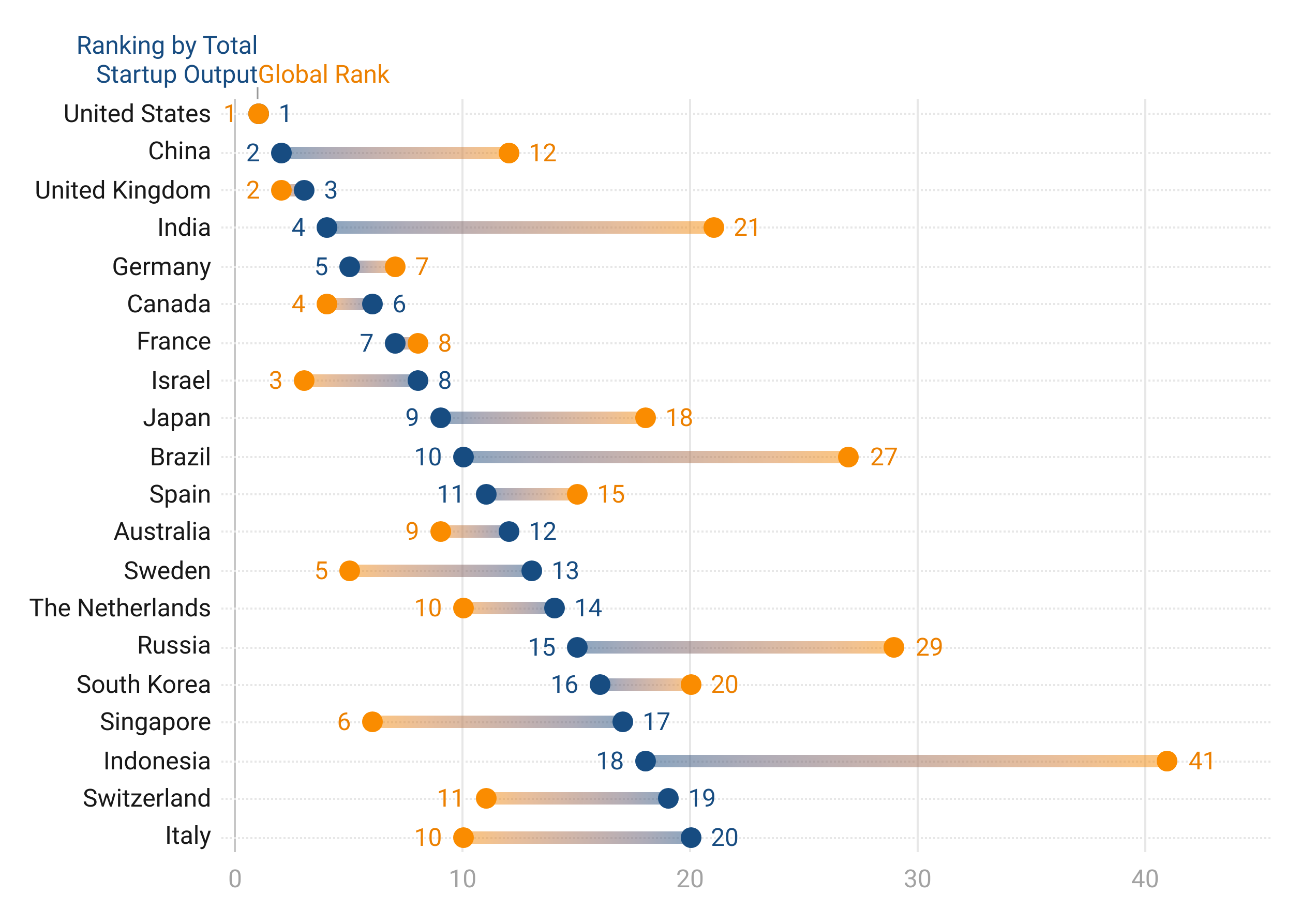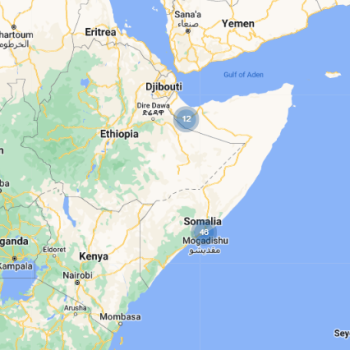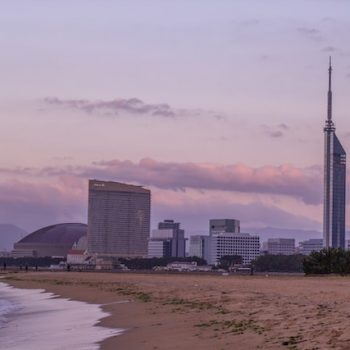In StartupBlink’s Global Startup Ecosystem Index (GSEI), the scoring algorithm takes into account the population size of countries to assess their startup output per capita. On the other hand, the total startup output, also referred to as the “Absolute Power” algorithm used in this report disregards population size and focuses solely on the total startup output of each country. This approach allows for a comparison of countries’ dominance in terms of sheer output, regardless of their population size.
This article offers a brief overview of some of the insights featured in the PRO version of the report: Top 100 Countries for Total Startup Output exclusively accessible to our PRO Users.
What's inside the full report?
The Full report is only available to StartupBlink PRO.
- Top 100 Country Analysis with Tables
- Extended Key Insights List
- Unlimited Access to Frequently Published Reports
It is important to note that countries with larger populations, such as China, India, Brazil, and Japan, are expected to have higher positions in the total startup output ranking due to their ability in producing more innovation. However, this report emphasizes that having a large population and higher total startup output ranking does not guarantee a top position in global rankings.
By analyzing the top 20 countries with the highest startup output in 2023, this report expands on the data derived from the GSEI. It highlights the influence of population size on total startup output rankings and emphasizes that other factors, beyond population alone, contribute to a country’s position in the global startup ecosystem.
Top 20 Countries by Total Startup Output
With the health checks on StartupBlink Pro, discover dozens of ranking parameters on thousands of cities and countries to learn strengths and weaknesses in each ecosystem.
Key Insights from the Top 20 Countries
The United States maintains its position as the leading country
Despite its population being just a fraction of China and India, the United States solidly maintains its first-place position in the total startup output rankings. This remarkable achievement underscores the unparalleled strength of the U.S. startup economy, surpassing both China and India, regardless of their larger populations.
One notable aspect to consider is the adjustment of rankings for population. In this regard, the US score emerges as nearly 4 times higher than the second-ranked country, highlighting its undeniable dominance in the startup landscape. Moreover, when examining the rankings without population adjustment, the US score expands to an astonishing 5.4 times higher than the next leading country. This significant disparity further exemplifies the overwhelming influence and authority that the US holds over other startup ecosystems.
The US’s enduring reign at the top of the rankings reveals its unparalleled power and influence in the global startup ecosystem.
China and India leverage their huge populations to dominate in this ranking

Despite having a significant gap with the US, it is noteworthy that China‘s position in the startup output rankings is 10 spots higher than its global rank. Yet, even with the disparity in scores, China manages to outperform numerous other countries, showcasing its substantial startup output and impressive innovation.
Moreover, despite China and India belonging to the same population tier, China’s total startup output score is nearly 2 times greater than that of India. This stark contrast highlights China’s robust startup ecosystem and its impressive capacity to generate a higher volume of entrepreneurial activity compared to its counterpart. China and India have the potential to achieve a higher global ranking by increasing their total startup output to a level that aligns with their vast populations.
The United Kingdom’s total startup output is beyond larger countries like India
When comparing the total startup output of the United Kingdom and China, it is understandable to expect that China would have the upper hand due to its larger population, and this holds true as China ranks 2nd while the UK ranks 3rd. However, what makes the UK’s position truly commendable is that it surpasses larger countries like Brazil, Japan, Indonesia, and India.
Israel, Switzerland, Singapore and The Netherlands are punching above their weight!
Israel stands out as the sole representative from countries with a population of less than 10 million in the top 10 of the startup output rankings. Notably, Switzerland, Singapore, and the Netherlands also demonstrate their impressive capabilities by securing positions among the top 20 countries worldwide. Despite their rankings in this Index being lower than their global rank, these countries showcase their ability to compete on a global scale, even in the face of competitors with massive populations such as China and India.
Indonesia showcases the largest divergence between Global and Total Startup Output Ranks
Indonesia’s ascent of 23 spots stands as the most significant among the top 20 rankings by total startup output. However, despite its population exceeding 200 million, Indonesia finds itself trailing behind smaller nations like Israel and Singapore. Hence, although Indonesia’s position significantly improves in this ranking, its output is still lower than smaller nations. Indonesia can do much better in the global rankings by increasing its total startup output to match the scale of its massive population.
Brazil ranked 17 spots above their Global Rank for startup output
Brazil has shown impressive performance by ranking 17 spots above their global rankings in terms of total startup output. This achievement highlights its position among the leading countries in generating startup activity. However, it is worth noting that it faces challenges when it comes to translating this output to per capita measures. In other words, its startup ecosystems might be thriving in terms of overall numbers, but they have yet to fully leverage their population sizes to achieve higher startup output per person.
More Insights from the top 20 by Total Startup Output
- Two EU countries, France and Germany, stand prominently among the top 10 in terms of total startup output. Additionally, when considering their total startup output, these countries demonstrate a slightly elevated position, further highlighting their distinction as the leading nations with the highest startup output within the business region.
- Australia, a country with a population just above 25 million, loses three spots when the scores are not adjusted for population, being surpassed by large nations such as Japan, Brazil and Spain.
- Japan exceeds its global rank by an impressive 9 spots, placing it at the 9th position worldwide in terms of total startup output. However, considering its population of 125 million people, there is significant untapped potential for Japan to achieve even greater positions in the global rankings.
Which Countries are missing from the Top 20 by Total Startup Output?
Despite some countries, such as Finland, Estonia, Ireland, Lithuania, and Denmark, not being included in this Index, it is important to mention them as they are ranked among the global top 20. These countries have faced challenges in leveraging their smaller populations to drive significant startup output to compete with large countries. However, Israel’s case can serve as an inspiration for small countries, as it has effectively harnessed its size as an advantage in the global startup ecosystem. It highlights the potential for small nations to excel and target global markets with innovative startups, as well as the strength they have in implementing innovative policies.
While the aforementioned countries may not currently feature among the top 20, you can unlock extensive insights on the full report featuring 100 countries if you are a StartupBlink Pro member.
Methodology
To ensure that the rankings are as accurate as possible, we have based our algorithm on objective, quantifiable data that can be comparatively measured across regions, countries, and cities. We refrained from using subjective tools such as surveys and interviews, and instead utilized data that was either accumulated directly from the StartupBlink map or has arrived from integration with a reliable global data partner. We allow as few assumptions as possible regarding cause and effect and focus on one thing: measuring results. We avoid relying on any theoretical models assuming the causes of success for startup ecosystems.
Every year our algorithm is more accurate, and it should be noted that each ecosystem’s momentum change is influenced by its achievements over the last year and by these algorithm improvements. We have been sampling startup ecosystem data on the curated and interactive StartupBlink Global Map, enabling us to test and perfect our algorithm based on vast data sets. We estimate that the core map dataset has a representative sample covering 10-15% of total relevant entities in global startup ecosystems. In addition, hundreds of thousands of entities and data integrations are taken into account via our global data partners. Each location’s final score is based on the exact same algorithm. However, we are aware that our sample size fluctuates depending on location and data sourcing. Our only intervention in the score is discounting locations, where we determined that the sample size of the entities is higher than average. In order to solve issues with lower than the average sample size, we have partnered with approximately 100 Ecosystem Partners, most of which are Government agencies, many of them in locations where our data is limited. We offer all governments administrative access to curate the dataset of their ecosystems at no cost, granting them complimentary access. On our rankings with Unicorns and Exits, we consider each startup’s valuation and add special filters to exclude government entities and corporate spin-offs.
About Us:
StartupBlink is the world’s most comprehensive startup ecosystem map and research center, working with over 100 government entities worldwide. StartupBlink’s global startup ecosystem map has tens of thousands of registered startups, coworking spaces, and accelerators, creating a robust sample of innovation globally.
Our Partners:









